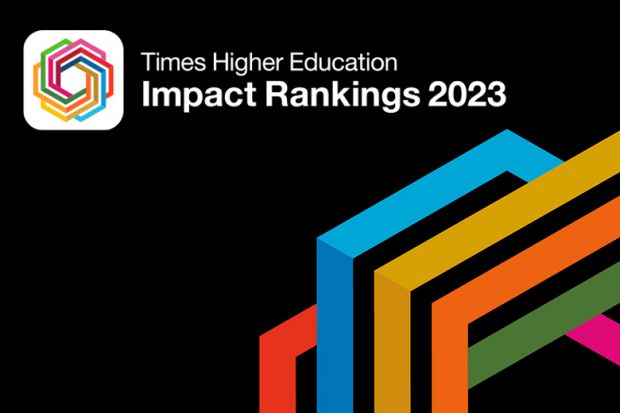泰晤士高等教育大学影响力排名是唯一一个基于联合国可持续发展目标(SDGs)来评估全球大学的排名。我们采用经过精心校准的指标来全面且均衡地比较4个宽广的领域,包括:研究、管理、外展活动和教学。
各领域的界定
研究: 一所大学或许能够帮助推进实现可持续发展目标的最显著且传统的方式就是通过对相关议题的研究。
管理: 大学是大量资源的管理者,这不仅指的是物质资源,还有他们的员工、教职工和学生。他们如何担任管理员是实现可持续发展目标的关键因素之一。
外展活动: 地理位置在高等教育中至关重要,而大学与本地、区域性、全国性和国际社区的合作是对可持续发展产生影响的另一种关键方式。
教学: 在确保有足够数量的经验丰富的践行者来推动可持续发展目标,以及确保所有校友将可持续发展的关键知识带入未来职业中这两个方面,教学都扮演着重要角色。
该排名包括哪些可持续发展目标?
联合国可持续发展目标共有17个,我们评估大学在所有17项目标中的表现:
- SDG 1 – 无贫穷
- SDG 2 – 零饥饿
- SDG 3 – 良好健康与福祉
- SDG 4 – 优质教育
- SDG 5 – 性别平等
- SDG 6 – 清洁用水和卫生设施
- SDG 7 – 经济适用的清洁能源
- SDG 8 – 体面工作和经济增长
- SDG 9 – 产业、创新和基础设施
- SDG 10 – 减少不平等
- SDG 11 – 可持续城市和社区
- SDG 12 – 负责任消费和生产
- SDG 13 – 气候行动
- SDG 14 – 水下生物
- SDG 15 – 陆地生物
- SDG 16 – 和平、正义与强大机构
- SDG 17 – 促进目标实现的伙伴关系
大学可以尽可能提交更多SDGs数据。每一个目标都有一系列指标来评估大学在该项的表现。
任何提供了SDG 17与至少3项其他可持续发展目标数据的大学将进入总排名。
除了总排名外,我们还将在17个单独排名中公布单项SDG的结果。这让我们能够为任何参与大学提供一个排名,即便它们无法进入总榜单。
排名是如何产生的?
一所大学在给定年份的总分是根据SDG 17及剩余16项SDGs中最佳数据前三综合计算而成的。其中,SDG 17占总分22%,其他单个SDG各占26%。这将使不同大学能基于各自的重点领域获得不同目标组合的评分。大学的总排名分数是过去两年总分的平均值。
每项SDG的评分均经过比例化,因此在总体计算中每个SDG的最高分是100、最低分是0分。这是为了对每个SDG得分范围内的细微差异进行调整,并确保公平地对待大学(无论该大学提供的是哪些SDG)。我们使用这些比例化的分数来确定大学在哪些SDG上表现最出色;它们有可能并非一所大学排名最高或未比例化分数最高的SDG。
这17项SDG的指标均展示在单项研究方法页面上。
单项SDG内的评分
每项SDG中都有3类指标:
研究指标来自爱思唯尔提供的数据。针对每项SDG,都有一个特定的列表,该列表将指标范围缩小到与该SDG相关的论文,并由人工智能识别的额外出版物进行补充。与世界大学排名一样,我们使用的是2017年至2021年间的5年窗口期。唯一的例外是SDG 9中引用研究专利的指标,这与专利发布的时间框架有关,而非研究本身的发布时间。每项SDG所选择的文献计量有所不同,并且始终至少使用两种文献计量。
延续性指标旨在衡量在一个范围内持续的影响力的贡献,例如,获得健康相关学位的毕业生数量。这些通常根据机构规模进行标准化。
当我们询问政策和计划时,比如是否存在指导计划,我们的指标要求大学提供证据以支持其主张。在这些案例中,我们鼓励提交证据,尤其是公开数据。这些指标通常不会按照机构规模进行标准化。
依照一组标准,我们将对证据进行评估,并在具有不确定性的部分进行交叉验证以做决策。所提交的数据并不需要彻底详尽——我们正在寻找一些有关高校的最佳实践作为示范。
时间线
通常来说,排名所采用数据时间线为距2021年1月至12月最近的学年。每个指标所采用的具体时间线可在完整的研究方法文件中进行查询。
排名资格
该排名向教授本科生和研究生水平的任何大学开放。虽然研究活动是排名研究方法的重要组成部分,我们并未对最低研究要求设置参与门槛。
如果认定一所大学提交虚假数据或运营状态不再良好,泰晤士高等教育保留将其从排名中排除的权利。
数据采集
机构提供并签署其用于排名的数据。在极少数情况下,如果特定数据点未被提供,我们将输入零。
本研究方法由泰晤士高等教育与合作伙伴Vertigo Ventures和爱思唯尔共同开发,并且已与大学、学者和行业团体进行讨论以及接受他们的建议。
点击此处查看2023年度泰晤士高等教育大学影响力排名的完整研究方法。




